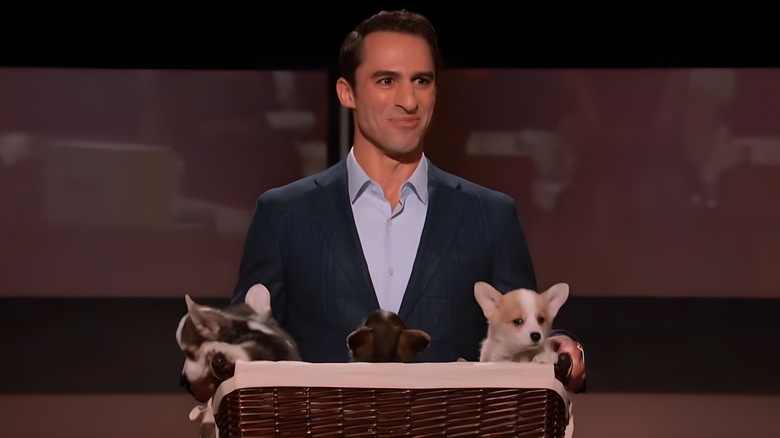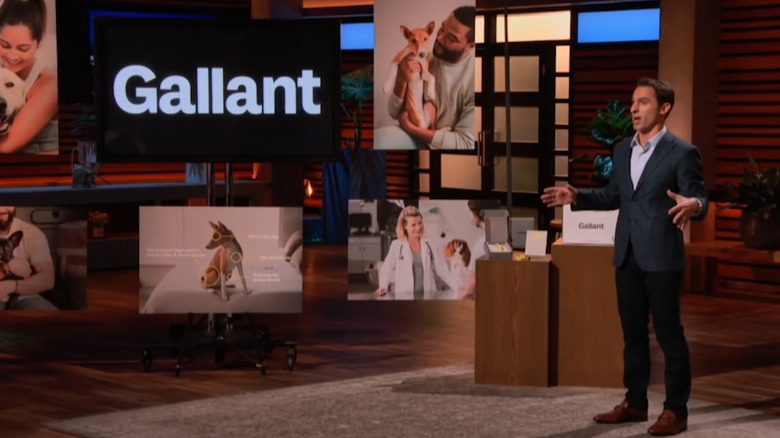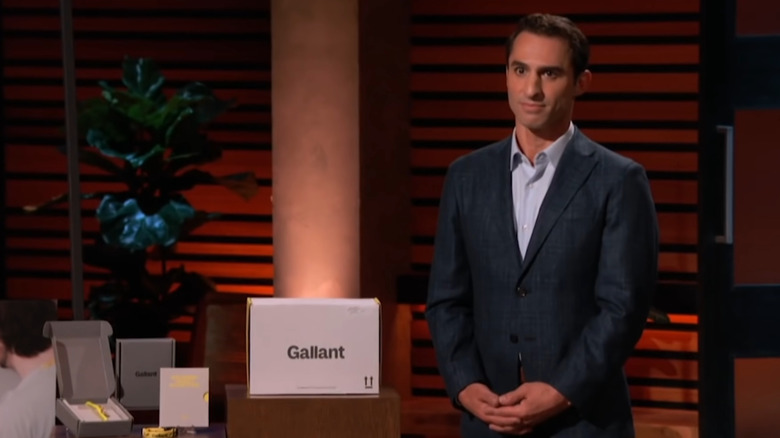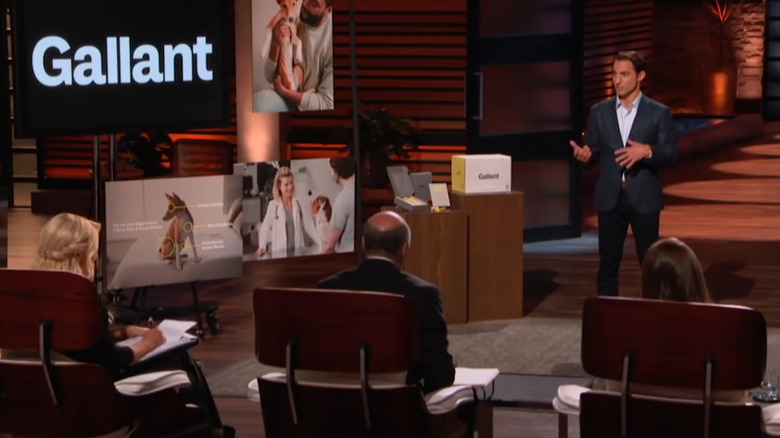Whatever Happened To Gallant After Shark Tank?
The bond we form with our furry friends is indescribable. Seeing them age over time is never easy, but help may be at hand with Aaron Hirschhorn's innovative idea, which makes stem cell banking for pets a reality. His business is Gallant, a stem cell treatment service for dogs and other pets. Similar to human stem cell treatment, this practice allows for your pet's young stem cells to be stored, which can later be used to alleviate ailments and injuries down the road. The cells are collected by your vet from the reproductive organs commonly discarded during a spay or neuter procedure at a young age, as the cells' regenerative qualities wane with age.
Hirschhorn spoke to the beneficial quality of this treatment during his appearance on "Shark Tank." Years ago, his chronic back pain was able to be treated using stem cell therapy. At the same time, his own dog was experiencing severe arthritis, which made it difficult for her to even walk. Hirschhorn wanted to find out if the same treatment that aided him could help his dog, which led to the creation of Gallant. Having had experience in the science space, Hirschhorn went on to develop the service with top-tier veterinary scientists and various investors. With a plan in place, the entrepreneur needed the help of a shark to kick his company into high gear.
What happened to Gallant on Shark Tank?
Aaron Hirschhorn made his way onto Season 11, Episode 8 of "Shark Tank" (which aired in November 2019) looking for a $500,000 investment for only 2% equity in Gallant. Was there enough puppy love in the room to justify Hirschhorn's $25 million valuation? Understandably, the sharks were concerned about his high valuation. However, Hirschhorn shared how his pet-sitting service, Dog Vacay, had merged with a competitor to become Rover and made a lot of money, so he came with some business know-how.
Concern hit the tank when Hirschhorn described the business model for Gallant, which was aimed at consumers at the time — kits were ordered directly by the pet owner and then taken to the vet. In an effort to make the practice more accessible, the kit was priced at $95 a year. However, when combined with vet fees and the cost of procedures, the company was set to lose money with each kit. On top of that, the company had been burning through $400,000 a month in R&D costs. Hirschhorn framed this as a short-term loss, but the sharks felt that he needed to raise the price right away.
Despite the initial trepidation, Kevin O'Leary made two different offers: One stipulated that he would get another 2% in options, while the other included $10 in royalties from every kit. Lori Grenier and guest shark Anne Wojcicki then teamed up with their own offer of $500,000 at 8%. After some negotiating, they brought the equity down to 5% and made the deal. As exciting as this moment was, an unexpected tragedy would soon strike Gallant.
Gallant after Shark Tank
Things were looking good for Gallant following "Shark Tank." While the deal with Lori Grenier and Anne Wojcicki never closed — which isn't too surprising considering Grenier's track record with closing deals — that didn't stop the "Shark Tank" effect from hitting the company as new subscribers came on board following the episode's airing. And, in late 2019, it acquired the vet tech company Cook-Regentec, along with its many resources in stem cell technology. "With a potentially huge market, wide-ranging expertise, and funding, the future of Gallant is bright," said Forbes following the acquisition.
Sadly, a tragedy took place not long afterward. In March 2021, Hirschhorn was killed when his motorized surfboard collided with a boat in Florida's Biscayne Bay. Gallant shared its devastation at his passing, stating in an Instagram post, "We are deeply heartbroken to share that our founder, Aaron Hirschhorn, passed away unexpectedly this past Sunday. He was a natural, charismatic leader, and he had built a true family at Gallant." He was survived by his three children and wife, Karine Nissim Hirschhorn, who shared on Facebook, "My beloved husband of ten years died yesterday in an accident. We are broken and will never be the same."
The company announced that Linda Black, Gallant's president and chief scientific officer, would be assuming Hirschhorn's place as CEO. Thankfully, the tragic event didn't put a stop to Gallant's efforts.
Is Gallant still in business?
Gallant is still a fully operational business as of this writing in 2025, offering stem cell therapies for animals in the hope of curing their ills and prolonging their lives. They isolate and grow mesenchymal stem cells (MSCs) harvested from qualified donors, which are then used to develop replacement cells. "MSCs help normalize aberrant immune responses by engaging with several subsets of immune cells (T-cells, B-cells, NK cells and dendritic cells), either through direct contact or through secretion of immunomodulatory factors," Gallant's website explains. "MSCs can also become bone, cartilage, muscle, and adipose (fat) cells, among others."
The company has multiple clinical trials in progress and is currently seeking pets suffering from certain illnesses to test out their methodologies. It has successfully completed one trial related to canine atopic dermatitis, which impacts as many as 13 million dogs. "Gallant has completed the phase one proof of concept and plans to start the phase two placebo-controlled large trial in 2025," the company said of its canine atopic dermatitis trial in a press release. It has also published several white papers on how its various therapies help illnesses in pets, though it's worth noting that the company no longer sells its services directly to consumers. They can, however, participate in open clinical trials with their animals.
What's next for Gallant?
Lots of clinical trials, apparently. Gallant has trials for feline chronic gingivostomatitis running in eight states, trials for feline chronic kidney disease in nine states, trials for canine osteoarthritis in eight states, and trials for feline osteoarthritis in eight states. If you have a pet that qualifies and would like to be part of the clinical trial, you should check out their trials in progress page. It also offers space for scientists who want to host their own trials.
Gallant is seemingly ready and able to continue on in Aaron Hirschhorn's name, even if its aims have changed slightly since the founder's appearance on "Shark Tank." It appears to be pioneering some wonderful advances in medical science for animals, and that's great news for everyone's four-legged companions. If you want to keep up with what the company's doing, you can do so on social media: Gallant's Instagram is frequently updated, as is its X page. You can also find the company on LinkedIn.




